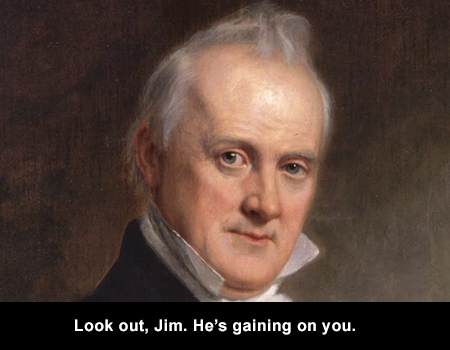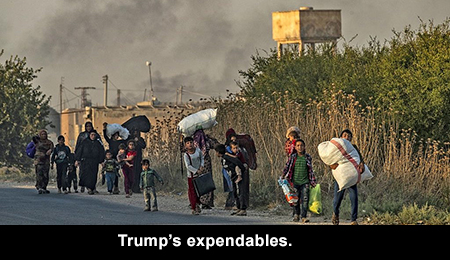There’s no question but that Donald Trump is the worst president in my lifetime, and I’m fairly certain he’s a serious contender for the worst president in American history. In most of the surveys I’ve seen, that position is held by pre-Civil War POTUS James Buchanan (1857 – 1861), but I think Buchanan’s one distinction is under serious threat … he may be surging to second worst by the end of Trump’s current term.
Of course, Trump doesn’t see it that way. His ranging, incoherent cabinet meeting this past Monday gave him the opportunity to crow about the greatest economy in American history, his single-handed defeat of ISIS, his deal-making acumen, and so on. Sure, he got Turkey mixed up with Iraq at one point, but who’s counting? He claims to be fulfilling a promise to bring American troops home, and one wishes that were true, but of course this claim – like everything else that comes out of his festering gob – is a cheap, transparent lie that wouldn’t fool a five-year-old. Like previous failed presidents, he sold the Kurds down the river, and they are paying a heavy price for his carelessness and self-dealing. (Trump freely admitted prior to the 2016 election that he had a conflict of interest with regard to Turkey, referencing his signature twin towers in Ankara; he still makes a lot of his money there.)

You would think it would be easy to compare Trump unfavorably to other recent presidents, but the picture does get kind of complicated kind of fast. There was a discussion of this on Morning Joe this week, wherein Joe, Mika, and historian Jon Meacham talked about leaders putting the nation ahead of their own narrow political interests. Sounds good, but the example Joe gave was that of Bill Clinton and Newt Gingrich in 1998, at the height of the impeachment conflict, working together to find a way “to contain Saddam Hussein.” I think what he’s referring to is the Iraq Liberation Act, passed in October 1998 and signed by Clinton, which provided the foundation for the 2003 war. This act came through at the peak of our sanction regime against Iraq that cost the lives of 300,000 Iraqi children, conservatively – a cost Clinton Secretary of State Madeleine Albright described as worth it. In other words, bad example.
Self-dealing and corruption are bad things, to be sure. They are not the only bad things, however, and we do ourselves no favor by forgetting the failed policies of past leaders in an attempt to single out the current president. It is obvious where he comes from, and we must beat him next year. But we must also accomplish so much more than that one goal. Status quo ante is not enough.
luv u,
jp


 What’s ironic is that these pundits should be surprised and appalled by such behavior. After all, the Saudis have been killing people by the thousand in Yemen. It appears that Yemeni children’s biggest mistake may be that they aren’t members of the Washington Post editorial board. And if memory serves, they were well represented in the 9/11/2001 attacks … nearly as many hijackers as there were assassins sent to kill Khashoggi. I’m surprised that the Saudis considered this such heavy lifting. Nevertheless, all of the gray-headed shills who were running around trumpeting the virtues of “MBS” will now have to find some way of reconciling themselves to the ugly truth: their hero is a murderous despot.
What’s ironic is that these pundits should be surprised and appalled by such behavior. After all, the Saudis have been killing people by the thousand in Yemen. It appears that Yemeni children’s biggest mistake may be that they aren’t members of the Washington Post editorial board. And if memory serves, they were well represented in the 9/11/2001 attacks … nearly as many hijackers as there were assassins sent to kill Khashoggi. I’m surprised that the Saudis considered this such heavy lifting. Nevertheless, all of the gray-headed shills who were running around trumpeting the virtues of “MBS” will now have to find some way of reconciling themselves to the ugly truth: their hero is a murderous despot. Still, it’s interesting that in both cases, the original impetus for the protest was a decision by the government affecting public services. Both Turkey and Brazil have been touted as relatively successful governments, and yet beneath many success stories there is often another story to tell, that of the poor, the working people, those left behind. You can see them in Brazil, in China, in India, in Turkey, just as you can see them here in the United States. True, the standard of living in Brazil has improved vastly over the last decade. But the people protesting increased transit fares are making us aware of the work that is yet to be done.
Still, it’s interesting that in both cases, the original impetus for the protest was a decision by the government affecting public services. Both Turkey and Brazil have been touted as relatively successful governments, and yet beneath many success stories there is often another story to tell, that of the poor, the working people, those left behind. You can see them in Brazil, in China, in India, in Turkey, just as you can see them here in the United States. True, the standard of living in Brazil has improved vastly over the last decade. But the people protesting increased transit fares are making us aware of the work that is yet to be done.